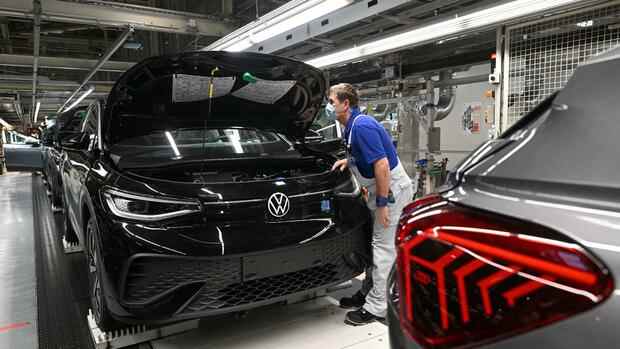German industry expanded its production in December.
(Photo: dpa)
Berlin Despite bulging order books, the production of German companies plagued by material bottlenecks fell well short of the pre-crisis level last year. Industry, construction and energy suppliers together produced 3.0 percent more than in the first Corona year 2020, as the Federal Statistical Office announced on Monday. However, production was still 5.5 percent below the pre-crisis year of 2019.
However, surveys signaled a gradual resolution of the delivery bottlenecks, as the Federal Ministry of Economics emphasized. “In combination with the high order backlog of the companies, this indicates a dynamic development of the industrial economy in the coming months.”
Economists see it that way too. “The basic conditions for a strong upturn in industrial production could hardly be more favourable,” said the chief economist at VP Bank, Thomas Gitzel, in view of the thick order books. “We need a sustainably better supply of preliminary products and raw materials so that industrial production can finally do what it is actually supposed to do – namely grow strongly.”
In December, industry, construction and energy suppliers together produced 0.3 percent less than in the previous month. Economists surveyed by Reuters, on the other hand, had expected an increase of 0.4 percent.
Top jobs of the day
Find the best jobs now and
be notified by email.
In November, production had grown by a revised 0.3 percent, after a minus of 0.2 percent had initially been determined. In 2021 as a whole, production was 3.0 percent higher than in the first Corona year, 2020, but it was still 5.5 percent lower than in the pre-crisis year of 2019.
Only industry increased in December
However, there is also a glimmer of hope: industry alone expanded its production by 1.2 percent in December, the third month in a row. This means that “a positive development is visible”, explained the Federal Ministry of Economics.
However, there is no clear picture within the industry. “As expected, automotive production, which was hit so hard last year, picked up sharply towards the end of the year, while other flagship sectors such as mechanical engineering or the chemical industry had to lose feathers,” said DekaBank economist Andreas Scheuerle. At the end of the year, utilities generated 0.7 percent less than in the previous month, while construction output even fell by 7.3 percent. The latter may have been at least partly due to the weather, said Scheuerle.
The German industrial companies are currently sitting on bulging order books. In the past few months, however, the orders could not be processed as usual – for example due to acute bottlenecks in preliminary products such as microchips, which are slowing down the automotive industry, for example.
The shortage of materials in industry eased somewhat at the beginning of the year: 67.3 percent of companies complained about bottlenecks and problems in procuring preliminary products and raw materials, as the Ifo Institute found out in its survey. In December it was still around 82 percent. 2It is not yet clear whether this is a trend reversal, ”said the head of the Ifo surveys, Klaus Wohlrabe.
More: Surprisingly, Lars Feld does not go to Austria after all
